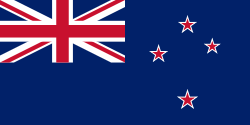| New Zealand at the 1956 Summer Olympics | |
|---|---|
 | |
| IOC code | NZL |
| NOC | New Zealand Olympic and British Empire Games Association |
| Website | www |
| in Melbourne/Stockholm | |
| Competitors | 53 in 9 sports |
| Flag bearer | Ritchie Johnston |
| Officials | 12 |
| Medals Ranked 16th |
|
| Summer Olympics appearances (overview) | |
| Other related appearances | |
New Zealand at the 1956 Summer Olympics was represented by a team of 53 competitors and 12 officials. Selection of the team for the Games in Melbourne, Australia, was the responsibility of the New Zealand Olympic and British Empire Games Association. New Zealand's flagbearer at the opening ceremony was Ritchie Johnston. The New Zealand team finished 16th on the medal table, winning a total of two medals, both of which were gold.